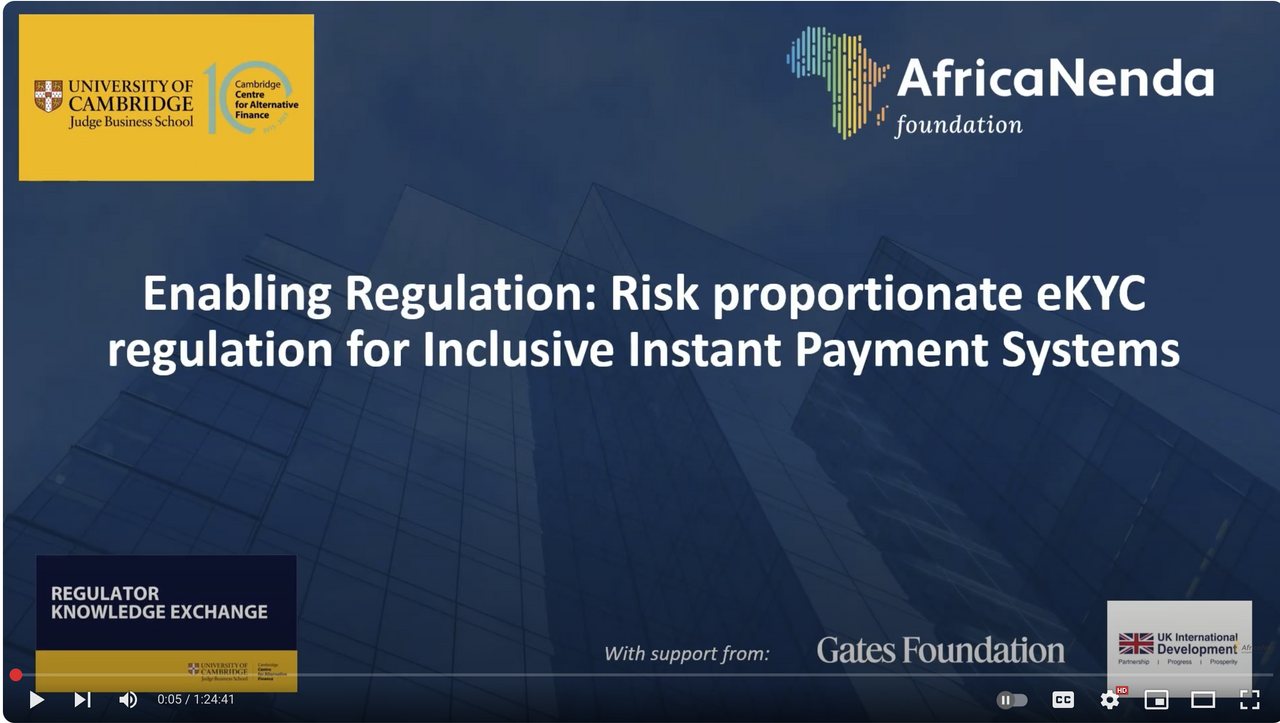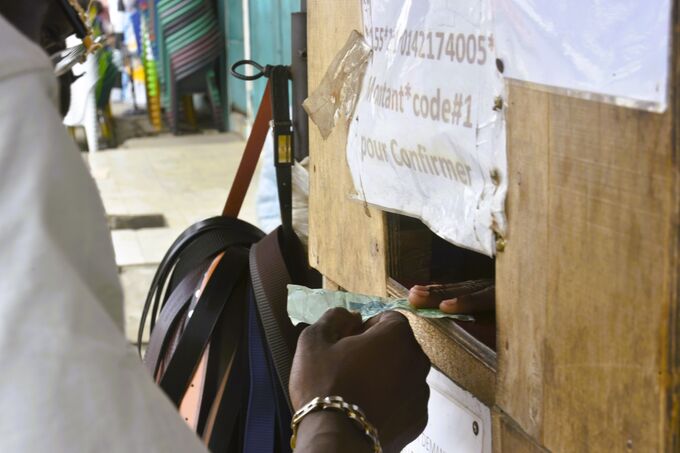
الأخبار
From Policy to People: Key Takeaways from Our Webinar on eKYC and Inclusive Instant Payments Systems in Africa
بواسطة Ornella Sianwa and Moustapha Gabar Diop, Communications Team, AfricaNenda Foundation - 30 يونيو 2025
In today’s digital economy, inclusive instant payment systems (IIPS) are a critical pillar for driving financial inclusion across Africa. But to ensure these systems are accessible, secure, and scalable, enabling regulation—especially around electronic Know Your Customer (eKYC) processes—is essential.
This topic was at the heart of a webinar on May 27th, 2025 hosted by the Cambridge Centre for Alternative Finance (CCAF) and AfricaNenda foundation, which brought together Kanwaljit Singh,Ph.D., Deputy Director of Gates Foundation in charge of Digital Public Infrastructure, Jacqueline Jumah, Director of Advocacy & Capacity Development at AfricaNenda, Mohamed Abdelrahman, Head of Payment Instruments & Acceptance Channels at the Central Bank of Egypt, Oluwasola Dada Ajewole, Deputy Director at the Central Bank of Nigeria and moderated by Sabine Mensah, Deputy CEO at AfricaNenda .
Together, they explored how risk-proportionate eKYC regulation can unlock greater inclusion and accelerate the adoption of IIPS across the continent.
From Paper to Digital: Why eKYC Matters?
As Jacqueline Jumah, Director of Advocacy & Capacity Development at AfricaNenda, outlined, the eKYC process is revolutionizing onboarding by replacing manual procedures with digital interactions. This includes:
- Submitting identity attributes (e.g., name, date of birth),
- Providing a credential (physical or electronic),
- Verifying identity through physical or digital validation.
The benefits are clear: improved data accuracy, increased accessibility—particularly for rural and low-literacy populations—and greater efficiency across the financial ecosystem.
Yet despite growing adoption in countries like Egypt, Kenya, Mauritius and Nigeria, regulatory and infrastructure gaps persist.
Lessons from Across the Continent
Several African countries are making strides with eKYC. Mauritius, for example, uses its “InfoHighway” platform for secure data exchange between government entities and financial service providers. Nigeria’s tiered KYC system has enabled the onboarding of low-risk users with minimal documentation—boosting inclusion from 25% in 2012 to 75% in 2023.
Still, challenges remain:
- Regulations are fragmented and often lack cross-border harmonization.
- Remote onboarding is frequently classified as “high risk” by default.
- PSP adoption remains low.
- Digital ID systems and verification infrastructure are unevenly developed.
What Needs to Change?
To close these gaps, panelists shared several recommendations, with a focus on a risk-based, flexible regulatory approach that balances security with accessibility. Key recommendations include:
- Implementing tiered and outcome-focused customer due diligence (CDD) models.
- Allowing the use of electronic credentials and remote verification methods, such as biometrics and video checks.
- Promoting interoperable data-sharing frameworks to enhance trust and collaboration.
- Strengthening national digital ID systems as a foundation for financial access.
- Developing regional guidelines to reduce regulatory arbitrage and support cross-border interoperability.
Balancing Risk, Innovation, and Inclusion
Dr. Kanwaljit Singh, Deputy Director at the Gates Foundation, emphasized that digital identity is not just about finance — it’s about enabling full participation in modern life. He called for identity systems that are accessible, interoperable, and supported by flexible, adaptive regulations.
Mohamed Abdelrahman, Head of Payment Instruments at the Central Bank of Egypt, shared how Egypt’s onboarding models — designed for both existing and unbanked users — helped drive inclusive growth while ensuring data protection and smooth user experiences. He noted that financial inclusion in Egypt surged from 64% to 95% in just two years, thanks in part to these flexible models.
Oluwasola Ajewole, Deputy Director at the Central Bank of Nigeria, highlighted the country’s tiered KYC approach and its transformative impact on financial access. However, he also stressed the ongoing need to strengthen infrastructure and fraud prevention systems.
Across the discussion, speakers emphasized the importance of adaptability in regulation and the need for a risk-based, user-centered approach.
Sabine Mensah, Deputy CEO at AfricaNenda, underscored the importance of moving beyond static frameworks and engaging proactively with stakeholders to ensure regulation keeps pace with innovation.
Participants also raised critical questions, including: Are IPS systems interoperable across borders? Does remote onboarding increase AML/CFT risks? How can institutions verify identity remotely? What about the rise in AI-generated fraud? Can users be granted partial access before full verification?
In response, panelists emphasized that collaboration, risk-based assessments, and continuous regulator–industry engagement are key to unlocking inclusive, secure digital ecosystems.
Building Inclusive Finance, One Policy at a Time
As Africa accelerates toward digital financial systems, success will depend on regulatory frameworks that are proportionate, forward-looking, and inclusive by design. Among these, eKYC stands out as a critical enabler — when thoughtfully implemented, it can unlock safe, seamless, and scalable access to financial services for millions across the continent.
At AfricaNenda, together with the Cambridge Centre for Alternative Finance and partners across the region, we remain committed to working with governments, central banks, and the private sector to support the development of enabling policies. Our shared goal is clear: to accelerate the adoption of inclusive instant payment systems and move closer to a financially empowered Africa.
Discover AfricaNenda's knowledge zone on the Regulatory Knowledge Exchange: https://rke.ccaf.io/category/africanenda



